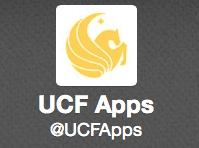There’s a UCFApp for That.
 Need to access various pieces of software for classes without installing them on your personal laptop? There’s an app for that.
Need to access various pieces of software for classes without installing them on your personal laptop? There’s an app for that.
At least, there will be soon. A $928,564 project proposal was awarded to the College of Sciences and 4 other colleges and divisions to develop a virtual apps program for the entire student body.
The project, dubbed UCF Apps, will enable students to access software applications such as Microsoft Office and SPSS on any device, including desktops, laptops, tablets and smartphones.
“As a student, I noticed that access to SPSS was less-than desirable for myself and my friends for the one class we had to take that needed it,” said JP Peters, IT and communications director for the College of Sciences. “We had to spend $200, or work within the schedule of a public lab, which sometimes was not available due to a lack of seats or limited hours.”
Peters noticed a savings potential for the college and students by offering applications virtually. IT managers from across the university began meeting about a year ago to discuss general issues that came up on campus, and it was during one of these meetings that the idea to potentially offer students software programs virtually was born.
Peters traveled with Craig Froehlich, division IT manager for marketing and communications at UCF, to the University of Florida and the University of South Florida where the technology already exists and works well for the students. They made the decision to model UCF Apps after existing, working models present at other universities, and submitted a tech fee proposal to the university last year.
The 2007 Florida Legislature amended Florida Statutes, Section 1009.24, to establish a technology fee beginning in fall 2009. The revenue from the fee, an assessment of about 5 percent of the student tuition cost that is already part of the fees paid when students pay their tuition, is used to enhance instructional technology resources for students and faculty.
“All that money is collected into a giant pot each year,” Froehlich said. “The colleges around the university are able to request money from that within some very specific parameters: It has to be academic-focused and benefit the students.”
A committee made up of students and staff throughout the university votes on the different projects and approves what it wants to spend the money on each year. Therefore, no additional costs will directly affect students, as the virtual apps programs roll out over the next few years.
“The project received approximately $928,000 to implement the pilot project and cover some support costs,” Peters said. “And additional support by the colleges participating in the pilot will pay for annual recurring costs of approximately $150,000.”
For students, UCF Apps will allow access to all programs currently available on any computer in a campus tech lab. Internet access is necessary on each device, and the program will work similarly to signing in on any UCF computer with an NID and password. Students would visit a website and login with their credentials before arriving at a “storefront” with all the applications they have access to, Peters said. Students would simply click on the application they desire to use, and it will open as if it was already installed on their device.
There’s also Citrix Receiver, a type of application that would give students automatic access from their desktops without having to go through a web browser.
“I think it’s a good idea, especially for people who like to work in their own environment,” said Jared Mims, a biology senior. “Another reason why it can become useful is for students who live far away from campus where coming to school becomes a hassle.”
Mims thinks the only problem is that grades might slip because students forget to do their assignments when they would normally be forced to complete the assignments in a lab.
That issue may be worked out with a soft-launch with a pilot group in fall 2014, which will include the following majors and colleges: College of Sciences (sociology and psychology), business, architecture, hospitality management and the Burnett Honors College. The pilot group will have access to 12 different software programs, including Microsoft Office and SPSS.
“The exposure, if you count the number of students, is about 20,000 students,” Froehlich said. “Through word of mouth, it may get out to other people and spread a little bit; we’re not necessarily going to lock it down for people who aren’t in those programs.”
The purpose of the pilot and restricting it is to make sure the correct infrastructure is in place for when the program rolls out to the rest of the university. Ideally, according to Froehlich, the program will be accessible to the entire student body by fall 2015, providing that funding to continue the initiative is available.
“I think enabling students to do their work anytime, anywhere, on their personal devices is the biggest benefit,” Peters said. “Don’t prefer working in a public lab? Work in the coffee shop or your dorm room.”
Peters said that the project will financially help students who pay high costs for software that is only needed for a semester or two, and that it will steer students away from obtaining software illegally from piracy sites, friends or other methods.
“The biggest thing is that it’s going to open up freedom [for students] to work when and where they want,” Froehlich said.
To follow the project, check out @UCFApps on Twitter.
To read original article from the Central Florida Future, click here.
